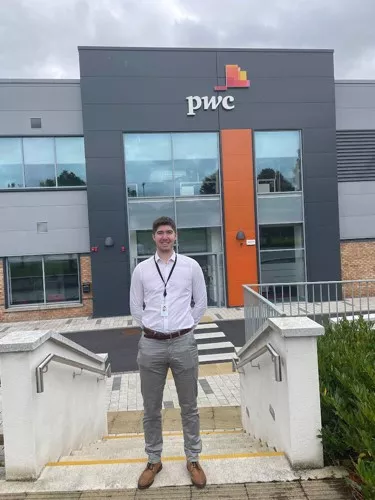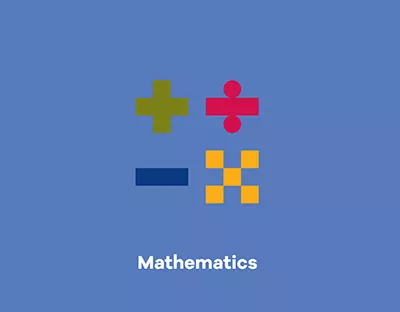Key Info
Bachelor of Science in Economics and Mathematics
Entry route(s):
If you like mathematics and economics, and like to question what underlies the physical and economic world around you, then this may well be the course for you. By the end of this course you will be able to understand and apply various mathematical and statistical techniques to gain insight into the physical and economic world around us.
Entry route to Economics and Mathematics at UL is via LM124 Mathematics Common Entry.
Why Study Economics and Mathematics Sciences at UL?
With strong applied quantitative skills, employment prospects for graduates of this programme are excellent. In a dynamic learning environment, you will develop high standards of numeracy and key skills in analytical thinking, therefore many diverse career opportunities will be open to you upon graduation.
The aim of this degree is to equip the mathematically competent students with a more specialised focus at the level of mathematical theory and statistical analysis, while simultaneously providing them with an exposure to the principles of economics and its key applications.
Learn more about our courses and upcoming events
What you will study
The course is full time over four years. In the first two years of the programme, students are introduced to the principles of macro - and microeconomics, calculus, and statistics. The final two years of the programme concentrate on the development of skills in mathematical modelling, statistical analysis and econometrics and their application to a range of problems in economics. The second semester of Year 3 is spent on a Cooperative Education placement. You will gain experience in a working environment which requires the skills that you will have developed during your studies.
In Years 2, 3 or 4, students can apply to spend a semester studying abroad at one of our partner institutes worldwide.
| Semester 1 | Semester 2 | ||
| MS4021 | Calculus 1 | MS4022 | Calculus 2 |
| MS4131 | Linear Algebra 1 | EC4102 | Macroeconomics |
| CE4701 | Computer Software 1 | MS4222 | Introduction to Probability & Statistics |
| EC4111 | Microeconomics | Electives – choose two of: | |
| Electives – choose one of: | AC4214 | Accounting for Financial Decision Making | |
| MS4122 | Further Linear Algebra | ||
| AC4213 | Financial Accounting | CE4702 | Computer Science 2 |
| PH4051 | Measure & Properties of Matter | ||
| PH4131 | Mechanics/Heat/Electricity/Magnetism | ||
| CS4221 | Foundations of Computer Science 1 | ||
| MS4101 | Mathematics Laboratory |
| Semester 3 | Semester 4 | ||
| MS4035 | Probability Models | EC4108 | Contemporary Issues in the Global Economy |
| MS4403 | Ordinary Differential Equations | EC4014 | International Economics |
| EC4213 | Intermediate Economics | EC4044 | Applied Economic Analysis |
| EC4307 | Econometrics | Electives – choose two of: | |
| MS4043 | Methods of Linear Analysis | MS4404 | Partial Differential Equations |
| MS4014 | Introduction to Numerical Analysis | ||
| MS4034 | Applied Data Analysis | ||
| MS4303 | Operations Research 1 |
| Semester 5 | Semester 6 | ||
| MS4214 | Statistical Inference | C04320 | Cooperative Education |
| MS4215 | Advanced-Data Analysis | ||
| EC4055 | Environmental Economics | ||
| EC4427 | Managerial Economics | ||
| Elective - choose one: | |||
| MA4617 | Introduction to Fluid Mechanics | ||
| MB4005 | Analysis | ||
| MS4105 | Linear Algebra 2 | ||
| MB4017 | Geometry |
| Semester 7 | Semester 8 | ||
| EC4417 | Industrial Economics | EC4408 | Public Finance |
| EC4437 | International Political Economy | EC4418 | Monetary Economics and International Finance |
| Electives - choose two: | Electives – choose two: | ||
| MS4217 | Stochastic Processes | MS4218 | Time Series Analysis |
| MS4315 | Operations Research 2 | MA4128 | Advanced Data Modelling |
| MS4117 | Discrete Mathematics 2 | MS4408 | Mathematical Modelling |
| MS4407 |
Perturbation Techniques & Asymptotics |
MS4018 | Dynamical Systems |
| MS4327 | Optimisation | ||
| Elective - Choose 1 | Elective - Choose 1 | ||
| EC4015 | Final Year Project Economics and Mathematics A | MS4017 | Final Year Project Economics and Mathematics B |
| MS4037 | Statistical Data Science Project 1 | MS4038 | Statistical Data Science Project 2 |
How to apply
| Where are you applying from? | How to Apply |
|---|---|
| Ireland | Irish students must apply to UL via the CAO. More information can be found here. |
| The UK | Students who have completed their A-Levels can apply to UL via the CAO. More information can be found on the Academic Registry website. |
| The EU | EU Students can apply to UL via the CAO. More information can be found on the Academic Registry website. |
| Non-EU country | If you are outside of the EU, you can apply for this degree here. |
Fees and funding
Student course fees are broken into three components - Student contribution, Student Levy and Tuition Fees.
A number of illustrative examples of fees for this course based on the current fee levels have been set out in the tables below.
An explanation of the components, how to determine status and the criteria involved is provided below the examples as is a list of possible scholarships and funding available.
EU Students with Free fees status in receipt of a SUSI grant
| HEA pays | Tuition Fees | €4,262 |
| SUSI pays | Student contribution | €3,000 |
| Student pays | Student Levy | €102 |
| Total | €7,364 |
EU Students with Free fees status not in receipt of a grant
| HEA pays | Tuition Fees | €4,262 |
| Student pays | Student contribution | €3,000 |
| Student pays | Student Levy | €102 |
| Total | €7,364 |
Students with EU fee status not in receipt of a grant
| Student pays | Tuition Fees | €4,262 |
| Student pays | Student contribution | €3,000 |
| Student pays | Student Levy | €102 |
| Total | €7,364 |
Non-EU Students
| Student pays | Tuition Fees | €20,900 |
| Student pays | Student Levy | €102 |
| Total | €21,002 |
Student course fees are comprised of the following components:
Student Contribution
Annual charge set by the government for all full-time third level students. All students are liable unless they have been approved for a grant by Student Universal Support Ireland (SUSI). Please refer to https://www.studentfinance.ie to determine your eligibility for a grant and for instructions on how to apply. The current student contribution is set at €3000.
Student Levy
All students are liable to pay the Student Levy of €102. Please note the Student Levy is not covered by the SUSI Grant.
Tuition Fees
These are based on Residency, Citizenship, Course requirements.
Review the three groups of criteria to determine your fee status as follows
-
Residency
- You must have been living in an EU/EEA member state or Switzerland for at least 3 of the 5 years before starting your course
-
Citizenship
- You must be a citizen of an EU/EEA member state or Switzerland or have official refugee status
-
Course Requirements
(all must be met)
- You must be a first time full-time undergraduate (Exceptions are provided for students who hold a Level 6 or Level 7 qualification and are progressing to a Level 8 course in the same general area of study).
- You must be undertaking a full-time undergraduate course of at least 2 years' duration
- You cannot be undertaking a repeat year of study at the same level unless evidence of exceptional circumstances eg serious illness is provided (in which case this condition may be waived)
Depending on how you meet these criteria your status will be one of the following -
- Free Fee Status: You satisfy all three categories (1, 2 and 3) and therefore are eligible for the Higher Education Authority’s Free Fees scheme.
- EU Fee Status: You satisfy both the citizenship and residency criteria but fail to satisfy the course requirements and are liable to EU fees.
- Non EU Fee Status: You do not meet either the citizenship or residency criteria and are therefore liable to Non EU fees.
More information about fees can be found on the Finance website
These scholarships are available for this course
| Title | Award | Scholarships Available |
|---|---|---|
| Johnson and Johnson WiSTEM2D Programme | ||
| The Critchley Prize | 1 |
These scholarships are available for all courses
| Title | Award | Scholarships Available |
|---|---|---|
| All Ireland Scholarships - sponsored by J.P. McManus | €6,750 | 125 |
| Brad Duffy Access Scholarship | €5,000 for one year | 1 |
| Bursary for my Future Scholarship | €2,750 one off payment | 4 |
| Civic Engagement Scholarship | €1500 | 1 |
| Cooperative Education Award | 1 medal per faculty | |
| Elaine Fagan Scholarship | €1,500 | |
| Financial Aid Fund | ||
| Hegarty Family Access Scholarships | €5,000 for one year | 2 |
| Higher Education Grants & VEC Grants | ||
| Irish American Partnership Access Scholarships | €5,000 | 2 |
| Paddy Dooley Rowing Scholarship | €2,500 | |
| Plassey Campus Centre Scholarship Programme | ||
| Provincial GAA Bursaries Scheme | €750 | |
| Stuart Mangan Scholarship | ||
| The Michael Hillery and Jacinta O’Brien Athletics Scholarship | Various benefits equating to over €7,000 in value | |
| UL Sports Scholarships | Varies depending on level of Scholarship | Multiple |
Your future career
Employability skills from this degree
- Analysing and interpreting data
- Finding patterns and drawing conclusions
- Applying economic principles and models
- Approaching problems in an analytical and rigorous way
- Formulating theories and applying them to solve problems
- Handling complex data and applying mathematical and statistical analysis methods
- Presenting mathematical arguments and conclusions with accuracy and clarity
- Logical thinking
- Communication and presentation skills
- Time management
- Organisational skills and working methodically and accurately
- Teamwork and the ability to work independently
- Statistical analysis
Further Study Options
Job titles for graduates with this degree
Graduates progressing directly into employment take up a wide variety of roles. The following provides a sample of initial roles listed on the Graduate Outcomes Survey by graduates approximately one year after graduation:
- Actuary
- Equities Trader
- IT Consultant
- Pensions Administrator
- Research Analyst
- Trainee Accountant
Student Profiles

Conor Flynn
I thoroughly enjoyed my experience throughout my BSc Economics and Mathematics. This course particularly suited me due to the fact it covered a wide range of topics from both a business and mathematics perspective. In this sense, I was able to gain a greater understanding of the business world while also developing skills in Data Analytics, Problem-solving and Computer Programming which I could apply in the business world. The common entry first year also gave me time to decide on which aspect I wanted to pursue further of Economics, Physics and Computer Science. I chose Economics as I felt this was the area I found most interesting and which also had the best career opportunities. Economics is a behavioural science and studies decision-making and the allocation of good and services in the market. This was of keen interest to me as I enjoy assessing the process of decision-making and also the optimal choices those in government should utilise to impact their economies. The learning style throughout the course involved elements of both individual and group based projects. This kept the learning interesting and allowed me to view problems from different perspectives as well as providing opportunities to improve my independent thinking and curiosity.
Since completing my course I have chosen to train to become a Chartered Accountant in audit with PwC. Although, this course is not specifically geared towards this field it offers a wide range of modules which have really helped me throughout this pursuit. The key areas of focus to become a Chartered Accountant are Financial Reporting, Financing Decisions, Management Accounting and Taxation. During this course I gained a basic understanding of Financial Reporting but gained an in-depth knowledge of Management Economics and Financial decision making. However, where this course has really helped me in my career is in my day to day work. As part of this course we used a wide range computer software and programming applications such as Excel, PowerPoint, Matlab and R. These have proved invaluable to me as I can tidy data, process and understand data quickly effectively and create data visualisations throughout my day to day work in audit easily. Such examples would include assessing the variances of financial statements balances year on year, tidying large spreadsheet data into ready to analyse data and using analytical techniques to test financial statement balances. If you enjoy problem solving, have a mathematical mind and have an interest in data analytics this course is for you.
Karen O'Sullivan
This course is ideally split almost 50-50 between maths and economics. In this way, both subjects are developed at the same pace - being able to relate each to the other is a huge bonus.
What I enjoy most about the course is the range of teaching methods used. Very few modules are purely taught on the whiteboard, or only taught through programming. Across both economics and maths, lecturers introduce the theory and then implement the theory though statistical programs. Because of this, I am well versed in around 5 different programming packages, which looks very well on my CV. Having all this programming knowledge as well as the underlying theory is very beneficial. It means I know how to apply the theory to real-world situations, to come to meaningful and useful results.
I was on Co-Op placement in the world’s largest aircraft lessor, GE Capital Aviation Services (GECAS) in Shannon, Co. Clare. I never thought that the aviation industry was applicable to my degree, but that is the beauty of a joint degree with diverse subjects.
I was part of the finance team for aircraft engine leasing. My role involved working with the worldwide engine team, updating monthly industry-demand reports based off real-world engine data, and issuing reports. I also had the opportunity to lead the rehaul of the department’s internal website. This was something completely new to me that was outside what I thought I could do. However, it was a fantastic thing to be part of, and I learnt many new skills in leadership and teamwork.
Having industry experience like UL’s Co-Op placement is invaluable in the jobs market and is a great CV booster. It is highly attractive to employers and gives you an edge when it comes to graduate employment. Co-Op provides a great understand of the professional workplace and really embellishes the fantastic degree that you will get in UL.


Laoise Coughlan
My name is Laoise and I’m currently working as a Data Science Consultant in the Applied Intelligence Department of Accenture Dublin. I graduated from the University of Limerick in 2020 with a BSc in Economics and Mathematical Sciences. My first introduction to Accenture was during my co-op placement in 2019 which was organised through the UL Cooperative Placement Programme. This was a 7-month internship which gave me insight of life working in the data science industry and heavily influenced my future long term career decision. I returned to Accenture in January 2021 and have worked across various projects and industries over the last 2 years.

